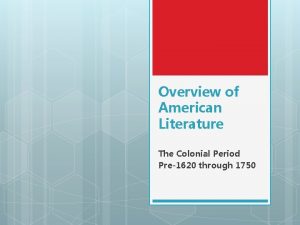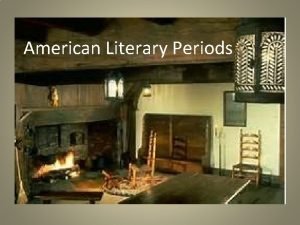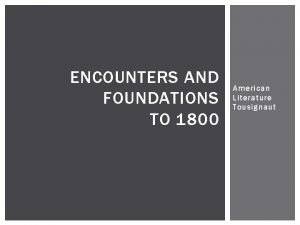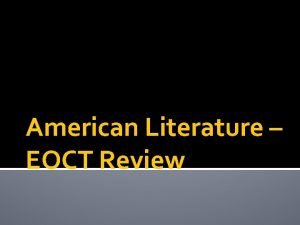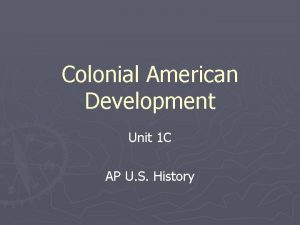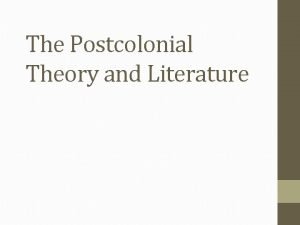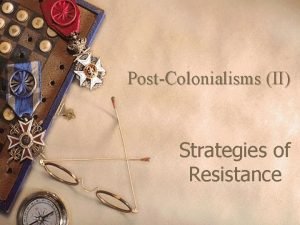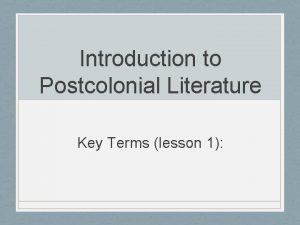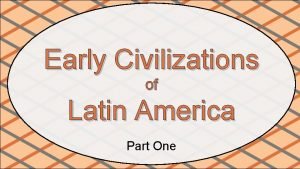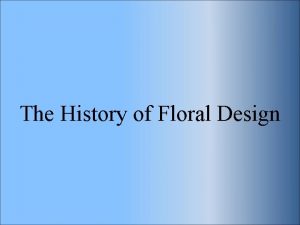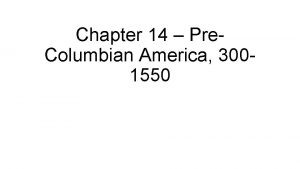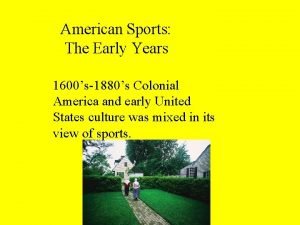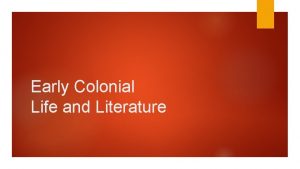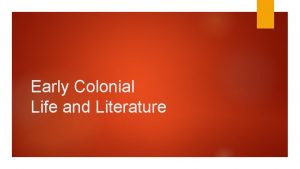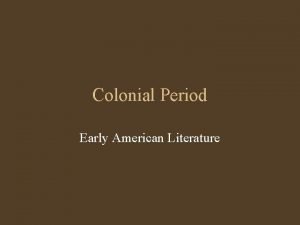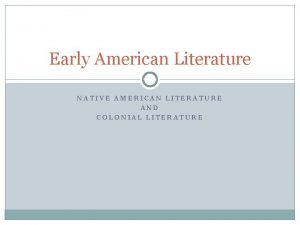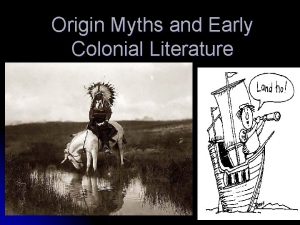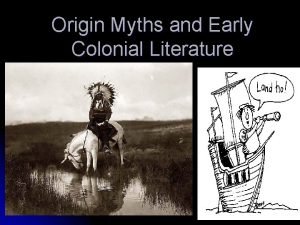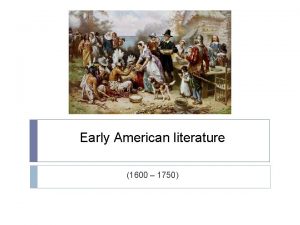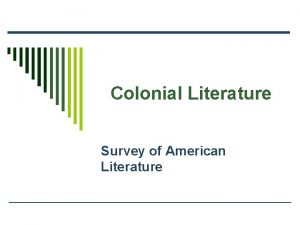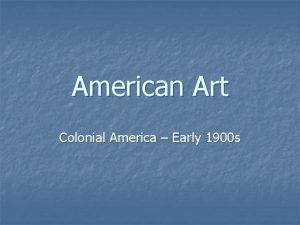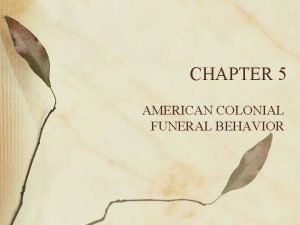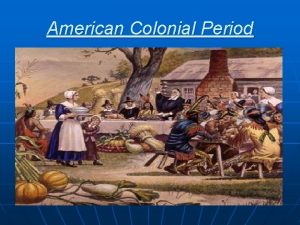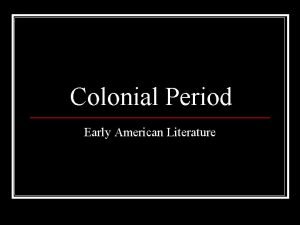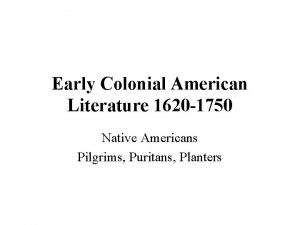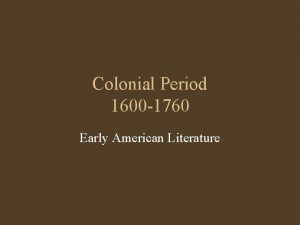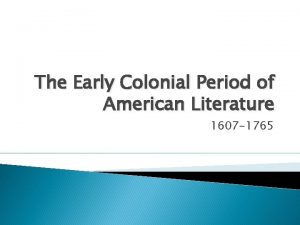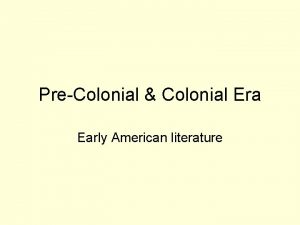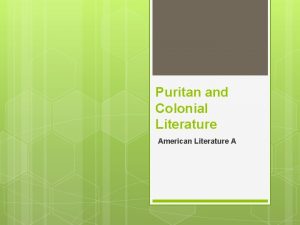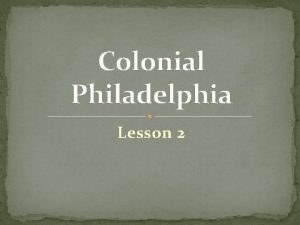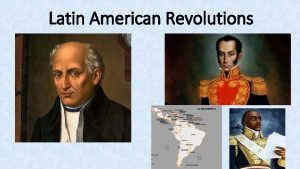Colonial Literature Early American Literature The Literature of






































- Slides: 38

Colonial Literature Early American Literature

The Literature of Early America • Colonists did not call themselves “Americans” before mid-18 th Century • Enormous displacement of Native American civilizations across the continent • French settled along the St. Lawrence River • Swedes settled along the Delaware River • Dutch settled along the Hudson River • Germans and Scots-Irish settled in New York and Penn • Spanish settled in Florida

Native American Civilizations and Cultures • Except for Central American natives’ documents, no • writings from North America before colonization • With Europeans came slaughter, slavery, diseases • lethal to Natives • Between 1492 and 1617, Native American population was reduced to 10% of original numbers • By the end of the 17 Century, Native population in Southern colonies went from 200, 000 to less than 60, 000 • Iroquois formed an alliance to try to counter colonial takeover of lands • Cherokees became agricultural in an attempt to assimilate • Tribes aligned with French during French and Indian War • (1754 -1763) to stop the British move westward

Exploration and Colonization • Columbus landed on Hispaniola (now island of Haiti and Dominican Republic), 1492 • Sir Walter Raleigh landed on Roanoke Island, NC, 1580 s • First British permanent colony =Jamestown, VA, • 1607 led by Captain John Smith • Pilgrims landed at Plymouth, Mass, 1620 • Puritans formed Mass Bay Colony, 1630 -43

Colonization • Reformation in Europe set the stage for colonization to North America • Henry VIII established Anglican Church, separated from the Roman Catholic Church control • Martin Luther denounced the Pope as infallible — Protestant religions flourished — Calvinism, Lutheranism, Anabaptists, Presbyterians/Episcopalians, Quakers • As religious control diminished, capitalism grew radically in England, France, Spain • Columbus, Ponce de Leon, Cabeza de Vaca, Coronado, and Pizarro sailed under Spanish flag

Colonization • British colonies fell into 3 cultural and economic groups • Southern from West Indies to Virginia • Most difficult to settle due to malaria, but ultimately the most prosperous with the introduction of African slaves • During 17, 18 &19 Centuries, 300, 000 slaves were sold in North America • Middle between Chesapeake and Massachusetts Bay • Most ethnically and religiously diverse • Dutch (New York) and Quakers (Penn) promoted freedom and tolerance • Quakers first to denouce slavery (1688) • New England • Settlement lagged behind other colonies due to bitter cold

The Renaissance, The Reformation, and Cultural Change • Renaissance began in Italy in 14 and 15 Centuries • Advances in art, government, philosophy, science • Reformation = separation of various monarchs from Roman Catholic control and establishment of “ protest” religions = Protestantism • Two great technical achievements = gunpowder and printing press • Firearms made armour obsolete • Books educated the masses, and weakened the power of kings and priests • Development of multiple-masted ships advanced global trade • Two scientific inventions = microscope (1590) and telescope (1606) encouraged scientific and geographic exploration

The Separatists and the Puritans • Puritans and Pilgrims were members of the Church of England • Pilgrims = Separatists moved to Holland in 1608 to practice a “pure and unspotted” Christianity • Eventually Pilgrims became disenchanted with Holland sailed to the Colonies =102 pilgrims left Holland about 50 landed at Plymouth, Mass. , in 1620 • Puritans came to New England to establish a colony based on “Bible law” =continued as official members of the Church of England • Puritans were worldly, did not practice as a cloistered group • Both Puritans and Pilgrims read the Geneva Bible (written by English scholars in Geneva, Switzerland, centre of Protestant learning and theology in Europe)


Separatists and Puritans • Doctrines of both groups were shaped by teachings of Martin Luther and John Calvin • Martin Luther (1483 -1546), a German monk, professor of theology at U of Wittenberg • Claimed the Bible should be the final word of God, not the Pope John Calvin (1509 -1564), a French theologian, lived and taught in Geneva, Switzerland • Calvin’s The Institutes of the Christian Religion, detailed Puritans’ beliefs of original sin, limited atonement, grace only from God, perseverance of saints, predestination • Central idea was covenant theology = Adam and Eve made covenant with God, then broke it

Puritans • Puritans were dedicated to self-determination independence and freedom, strong tradition of preaching, and thus education • Sermons were most popular literary form • Mass Bay Colony became cultural centre of colonies • Harvard founded at Cambridge in 1636 • First colonial press established in 1638 at Cambridge • First book printed in colonies in 1640 • First colonial newspaper published in Boston in 1690

• Puritanism declined before end of colonial period • Religious and social unity gave way to diversity • Early American literature, following the Puritan era, included • Biographies • Secular poetry • Political documents/speeches

William Bradford (1590 -1657) • Original home in Yorkshire, England • Orphaned son of yeoman farmer • In 1606 Bradford joined a group of religious separatists that met secretly in nearby village of Scrooby • In 1608 Bradford went to Amsterdam with the Separatists, then to Leyden, where he became a weaver, learned Dutch, French, Latin, Greek and Hebrew • In 1617 Separatists decided to go to New World • In 1620 Separatists obtained a charter from England (granting the right to settle on land in America owned by the Virginia Company of London) • Merchant Adventurers ( investors in London) financed the trip • In return Separatists agreed to ship furs, fish and minerals back to London

William Bradford • 102 men, women and children crowded on Mayflower for America – only a few were Separatists • 65 days later they landed at Cape Cod, Mass. • Because they were not in Virginia, they agreed to sign a Mayflower Compact, self-government document • Elected first governor, John Carver • When Carver died, Bradford succeeded him, from 1621 to 1656 • Bradford began writing history of Plymouth Plantation in 1630 – finally published in 1856 • Remained pious, humble, and personally poor • Died in 1657 at 67 years

Roger Williams (1603 -1683) • Born in London to middle-class merchant family • At Cambridge University, prepared for career in the church • In 1629 took a position as chaplain to a wealthy family • Became a Separatist, and in 1630 left for Massachusetts • In New World Williams’ unorthodoxy bloomed • Settled in Salem, spoke out against Puritan leadership • Moved to Plymouth Colony • In 1633 returned to Mass Bay Colony and became minister of Salem church • Continued to speak out against religious establishment • Argued for separation of church and state • In 1635 Williams banished from Colony as a heretic and threatened with deportation to England • Fled into wilderness, given refuge by friendly Indians • Migrated to Rhode Island established Providence Plantation

Roger Williams • Rhode Island Way established • Indian rights protected, church and state separated, religious tolerance maintained • Colony prospered • Williams’ writings were paradoxical =hearty and generous, but rash and destructive • Williams honoured freedom more than harmony, liberty more than order • Since 19 th Century, Williams honoured as an American saint, political ancestor of Jefferson


Anne Bradstreet (1612 -1672) • First poet of English-speaking North America • Puritan who balanced her roles of wife and mother and • published poet • Born in England, raised in luxury on the estate of the Earl of Lincoln, where her father, Thomas Dudley, was steward • At 16 she married Simon Bradstreet, Puritan and Cambridge University graduate • Both families—Dudleys and Bradstreets—sailed on Arbella to Mass Bay Colony • In Mass Bay Colony Thomas Dudley succeeded John • Winthrop as governor of Colony


Anne Bradstreet • Bradstreet and husband settled on farm near Andover, raised eight children, and she wrote poetry • In 1647 Bradstreet’s brother-in-law, John Woodbridge, pastor of Andover church, sailed to England, taking copies of her poems • In 1650 poems were published – The Tenth Muse Lately Sprung Up in American or Several Poems, Compiled with a Great Variety of Wit and Learning, Full of Delight…by a Gentlewoman of Those Parts= first volume of published poetry written by colonist • Poems addressed vanity of worldly pleasures, brevity of life, resignation to God’s will • Poems published posthumously in 1678 show more doubts about Christian beliefs, scepticism, and poetry was simpler, more lyrical


Cotton Mather (1663 -1728) • Grandfathers, Richard Mather and John Cotton –founders of New England church and state • Father, Increase Mather, president of Harvard • Cotton Mather was brilliant • By 12 he had learned Latin, read New Testament in Greek, studied Hebrew • At Harvard, he was considered a bookworm, but graduated at 15 • Stuttered as a child, but stuttering improved as an adult, and Mather was ordained in 1685 at Second Church of Boston, where he was its minister for the rest of his life.

Cotton Mather • Mather’s life filled with trials and tribulations • Had 15 children, but only two survived him • Married three times, first two died, third went insane • Financial problems, public humiliations caused by a bad son • Agonizing doubts about his calling to the ministry • Has been linked to Salem witch trials, but he never actually participated in them, although he did believe in witchcraft • Elected Fellow of the Royal Society of London • Advocated inoculations against smallpox • Author of > 400 works: essays, biographies, science, medicine, philosophy and theology studies, and thousands of sermons • Most didactic, attempts at reinvigorating waning Puritanism • Mather’s vision of New England was a theocratic Eden • Ultimately Mather became a symbol of a declining religion


Literature of the Eighteenth Century • 18 th Century = Age of Reason, Enlightenment • Profound changes took place in western world • European and African populations in North America – from 250, 000 in 1700 to 5, 000 in 1800 • Continuous westward expansion displaced Native Americans • Iroquois Confederacy = Mohawk, Oneida, Onondaga, • Cayuga, Seneca, Tuscarora nations, aligned with French • British won the French and Indian war nevertheless and took control of most of the territory east of Mississippi • Ethnic diversity, economic strength, Enlightenment ideals laid foundation for the United States


Functions of the Writers of the Colonial Period 1. A searching inquiry in all aspects of the world around. 2. Interest in the classics as well as in the Bible. 3. Interest in nature - the "absentee landlord" phenomenon. 4. Interest in science and scientific experiments. 5. Optimism - experiments in utopian communities 6. Sense of a person's duty to succeed. 7. Constant search of the self - emphasis on individualism in: a. personal religion. b. study of the Bible for personal interpretation.


Common Beliefs 1. Faith in natural goodness - a human is born without taint or sin; the concept of tabula rasa or blank slate. 2. Perfectibility of a human being - it is possible to improve situations of birth, economy, society, and religion. 3. The sovereignty of reason - echoes of Rene Descartes' cogito ergo sum or I think, therefore, I am (as the first certitude in resolving universal doubt. ) 4. Universal benevolence - the attitude of helping everyone. 5. Outdated social institutions cause unsociable behavior religious, social, economic, and political institutions, which have not modernized, force individuals into unacceptable behavior.

Democratic Origins and Revolutionary Writers, 1776 -1820 The hard-fought American Revolution against Britain (17751783) was the first modern war of liberation against a colonial power. The triumph of American independence seemed to many at the time a divine sign that America and her people were destined for greatness. Military victory fanned nationalistic hopes for a great new literature. Yet with the exception of outstanding political writing, few works of note appeared during or soon after the Revolution.


Democratic Origins and Revolutionary Writers, 1776 -1820 American books were harshly reviewed in England. Americans were painfully aware of their excessive dependence on English literary models. The search for a native literature became a national obsession. As one American magazine editor wrote, around 1816, "Dependence is a state of degradation fraught with disgrace, and to be dependent on a foreign mind for what we can ourselves produce is to add to the crime of indolence the weakness of stupidity. "


American Writers James Fenimore Cooper Thomas Paine

Democratic Origins and Revolutionary Writers, 1776 -1820 Moreover, the heady challenges of building a new nation attracted talented and educated people to politics, law, and diplomacy. These pursuits brought honor, glory, and financial security. Writing, on the other hand, did not pay. Early American writers, now separated from England, effectively had no modern publishers, no audience, and no adequate legal protection. Editorial assistance, distribution, and publicity were rudimentary.


• Because imported authorized editions were more expensive and could not compete with pirated ones, the copyright situation damaged foreign authors such as Sir Walter Scott and Charles Dickens, along with American authors. But at least the foreign authors had already been paid by their original publishers and were already well known. Americans such as James Fenimore Cooper not only failed to receive adequate payment, but they had to suffer seeing their works pirated under their noses. Cooper's first successful book, The Spy (1821), was pirated by four different printers within a month of its appearance. • Ironically, the copyright law of 1790, which allowed pirating, was nationalistic in intent. Drafted by Noah Webster, the great lexicographer who later compiled an American dictionary, the law protected only the work of American authors; it was felt that English writers should look out for themselves.

 American literature colonial period
American literature colonial period Colonial literary period
Colonial literary period Which era is known for symmetrical tree like designs?
Which era is known for symmetrical tree like designs? Encounters and foundations to 1800 comprehension answers
Encounters and foundations to 1800 comprehension answers What are the characteristics of early american literature
What are the characteristics of early american literature Early american literature themes
Early american literature themes Who is this
Who is this Early cpr and early defibrillation can: *
Early cpr and early defibrillation can: * Postcolonial theory in literature
Postcolonial theory in literature Post colonial literature
Post colonial literature Neocolonialism
Neocolonialism Colonial literature characteristics
Colonial literature characteristics American federal floral design
American federal floral design Early american period floral design
Early american period floral design Inca diorama
Inca diorama Middle ages flower arrangements
Middle ages flower arrangements Lesson quiz 14-2 pre-columbian america answers
Lesson quiz 14-2 pre-columbian america answers Empire period floral design
Empire period floral design Colonial america sports
Colonial america sports Hát kết hợp bộ gõ cơ thể
Hát kết hợp bộ gõ cơ thể Bổ thể
Bổ thể Tỉ lệ cơ thể trẻ em
Tỉ lệ cơ thể trẻ em Gấu đi như thế nào
Gấu đi như thế nào Thang điểm glasgow
Thang điểm glasgow Hát lên người ơi alleluia
Hát lên người ơi alleluia Môn thể thao bắt đầu bằng từ đua
Môn thể thao bắt đầu bằng từ đua Thế nào là hệ số cao nhất
Thế nào là hệ số cao nhất Các châu lục và đại dương trên thế giới
Các châu lục và đại dương trên thế giới Công thức tính độ biến thiên đông lượng
Công thức tính độ biến thiên đông lượng Trời xanh đây là của chúng ta thể thơ
Trời xanh đây là của chúng ta thể thơ Mật thư anh em như thể tay chân
Mật thư anh em như thể tay chân Phép trừ bù
Phép trừ bù Phản ứng thế ankan
Phản ứng thế ankan Các châu lục và đại dương trên thế giới
Các châu lục và đại dương trên thế giới Thể thơ truyền thống
Thể thơ truyền thống Quá trình desamine hóa có thể tạo ra
Quá trình desamine hóa có thể tạo ra Một số thể thơ truyền thống
Một số thể thơ truyền thống Cái miệng nó xinh thế
Cái miệng nó xinh thế
